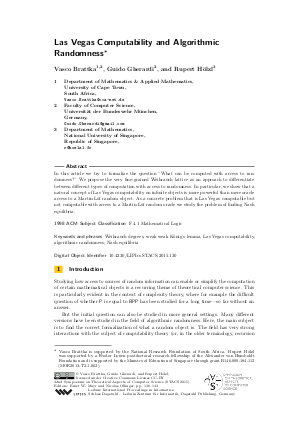Las Vegas Computability and Algorithmic Randomness
Authors Vasco Brattka, Guido Gherardi, Rupert Hölzl
-
Part of:
Volume:
32nd International Symposium on Theoretical Aspects of Computer Science (STACS 2015)
Part of: Series: Leibniz International Proceedings in Informatics (LIPIcs)
Part of: Conference: Symposium on Theoretical Aspects of Computer Science (STACS) - License:
 Creative Commons Attribution 3.0 Unported license
Creative Commons Attribution 3.0 Unported license
- Publication Date: 2015-02-26
File

PDF
LIPIcs.STACS.2015.130.pdf
- Filesize: 0.64 MB
- 14 pages
Document Identifiers
Subject Classification
Keywords
- Weihrauch degrees
- weak weak König's lemma
- Las Vegas computability
- algorithmic randomness
- Nash equilibria
Metrics
- Access Statistics
-
Total Accesses (updated on a weekly basis)
0Document
0Metadata
Abstract
In this article we try to formalize the question "What can be computed with access to randomness?" We propose the very fine-grained Weihrauch lattice as an approach to differentiate between different types of computation with access to randomness. In particular, we show that a natural concept of Las Vegas computability on infinite objects is more powerful than mere oracle access to a Martin-Löf random object. As a concrete problem that is Las Vegas computable but not computable with access to a Martin-Löf random oracle we study the problem of finding Nash equilibria.
Cite As Get BibTex
Vasco Brattka, Guido Gherardi, and Rupert Hölzl. Las Vegas Computability and Algorithmic Randomness. In 32nd International Symposium on Theoretical Aspects of Computer Science (STACS 2015). Leibniz International Proceedings in Informatics (LIPIcs), Volume 30, pp. 130-142, Schloss Dagstuhl – Leibniz-Zentrum für Informatik (2015)
https://doi.org/10.4230/LIPIcs.STACS.2015.130
BibTex
@InProceedings{brattka_et_al:LIPIcs.STACS.2015.130,
author = {Brattka, Vasco and Gherardi, Guido and H\"{o}lzl, Rupert},
title = {{Las Vegas Computability and Algorithmic Randomness}},
booktitle = {32nd International Symposium on Theoretical Aspects of Computer Science (STACS 2015)},
pages = {130--142},
series = {Leibniz International Proceedings in Informatics (LIPIcs)},
ISBN = {978-3-939897-78-1},
ISSN = {1868-8969},
year = {2015},
volume = {30},
editor = {Mayr, Ernst W. and Ollinger, Nicolas},
publisher = {Schloss Dagstuhl -- Leibniz-Zentrum f{\"u}r Informatik},
address = {Dagstuhl, Germany},
URL = {https://drops.dagstuhl.de/entities/document/10.4230/LIPIcs.STACS.2015.130},
URN = {urn:nbn:de:0030-drops-49093},
doi = {10.4230/LIPIcs.STACS.2015.130},
annote = {Keywords: Weihrauch degrees, weak weak K\"{o}nig's lemma, Las Vegas computability, algorithmic randomness, Nash equilibria}
}
Author Details
References
-
Eric Allender, Harry Buhrman, Michal Koucký, Dieter van Melkebeek, and Detlef Ronneburger. Power from random strings. SIAM Journal on Computing, 35(6):1467-1493, 2006.

-
Jeremy Avigad, Edward T. Dean, and Jason Rute. Algorithmic randomness, reverse mathematics, and the dominated convergence theorem. Annals of Pure and Applied Logic, 163(12):1854-1864, 2012.

-
László Babai. Monte-Carlo algorithms in graph isomorphism testing. Technical Report No. 79-10, Université de Montréal, Département de Mathématique et de Statistique, 1979.

-
Vasco Brattka, Matthew de Brecht, and Arno Pauly. Closed choice and a uniform low basis theorem. Annals of Pure and Applied Logic, 163(8):986-1008, 2012.

-
Vasco Brattka and Guido Gherardi. Effective choice and boundedness principles in computable analysis. The Bulletin of Symbolic Logic, 17(1):73-117, 2011.

-
Vasco Brattka and Guido Gherardi. Weihrauch degrees, omniscience principles and weak computability. The Journal of Symbolic Logic, 76(1):143-176, 2011.

-
Vasco Brattka, Guido Gherardi, and Rupert Hölzl. Probabilistic computability and choice. July 2014. Preliminary version available at http://arxiv.org/abs/1312.7305.

-
Vasco Brattka, Guido Gherardi, and Alberto Marcone. The Bolzano-Weierstrass theorem is the jump of weak Kőnig’s lemma. Annals of Pure and Applied Logic, 163(6):623-655, 2012.

-
Vasco Brattka, Matthew Hendtlass, and Alexander P. Kreuzer. On the uniform computational content of computability theory. January 2015. Preliminary version available at http://arxiv.org/abs/1501.00433.

-
Vasco Brattka and Arno Pauly. Computation with advice. In Xizhong Zheng and Ning Zhong, editors, CCA 2010, Proceedings of the Seventh International Conference on Computability and Complexity in Analysis, Electronic Proceedings in Theoretical Computer Science, pages 41-55, 2010.

-
François G. Dorais, Damir D. Dzhafarov, Jeffry L. Hirst, Joseph R. Mileti, and Paul Shafer. On uniform relationships between combinatorial problems. Transactions of the AMS, 2014. Accepted for publication. Preliminary version available at http://arxiv.org/abs/1212.0157.

-
Rodney G. Downey and Denis R. Hirschfeldt. Algorithmic randomness and complexity. Theory and Applications of Computability. Springer, New York, 2010.

-
Guido Gherardi and Alberto Marcone. How incomputable is the separable Hahn-Banach theorem? Notre Dame Journal of Formal Logic, 50(4):393-425, 2009.

-
Antonín Kučera. Measure, Π⁰₁-classes and complete extensions of PA. In Heinz-Dieter Ebbinghaus, Gert H. Müller, and Gerald E. Sacks, editors, Recursion Theory Week. Proceedings of the Conference Held at the Mathematisches Forschungsinstitut in Oberwolfach, April 15-21, 1984, volume 1141 of Lecture Notes in Mathematics, pages 245-259. Springer, Berlin, 1985.

-
Rajeev Motwani and Prabhakar Raghavan. Randomized Algorithms. Cambridge University Press, Cambridge, 1995.

-
John Nash. Non-cooperative games. Annals of Mathematics, 54:286-295, 1951.

-
André Nies. Computability and Randomness, volume 51 of Oxford Logic Guides. Oxford University Press, New York, 2009.

-
Noam Nisan, Tim Roughgarden, Éva Tardos, and Vijay V. Vazirani, editors. Algorithmic Game Theory. Cambridge University Press, Cambridge, 2007.

-
Arno Pauly. How incomputable is finding Nash equilibria? Journal of Universal Computer Science, 16(18):2686-2710, 2010.

-
Arno Pauly. On the (semi)lattices induced by continuous reducibilities. Mathematical Logic Quarterly, 56(5):488-502, 2010.

-
Arno Pauly. Computable Metamathematics and its Application to Game Theory. PhD thesis, University of Cambridge, Computer Laboratory, Clare College, Cambridge, 2011.

-
Stephen G. Simpson. Subsystems of Second Order Arithmetic. Perspectives in Logic, Association for Symbolic Logic. Cambridge University Press, Poughkeepsie, 2009.

-
Nazanin R. Tavana and Klaus Weihrauch. Turing machines on represented sets, a model of computation for analysis. Logical Methods in Computer Science, 7(2:19):1-21, 2011.

-
Klaus Weihrauch. The degrees of discontinuity of some translators between representations of the real numbers. Technical Report TR-92-050, International Computer Science Institute, Berkeley, July 1992.

-
Klaus Weihrauch. Computable Analysis. Springer, Berlin, 2000.

-
Martin Ziegler. Real hypercomputation and continuity. Theory of Computing Systems, 41(1):177-206, 2007.

